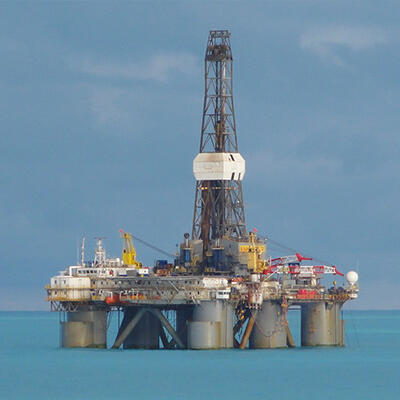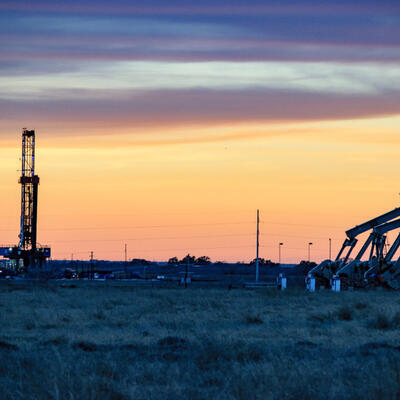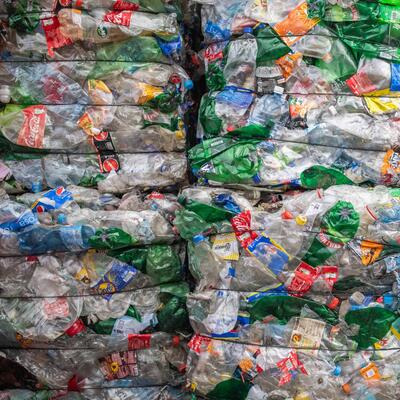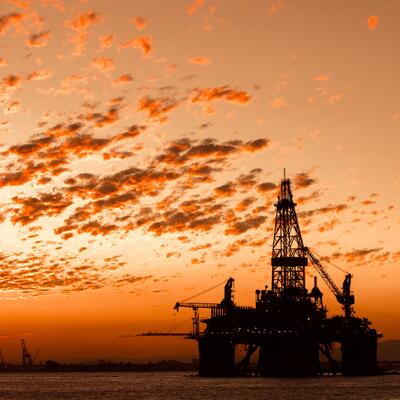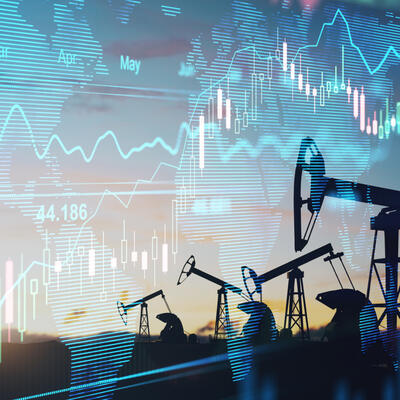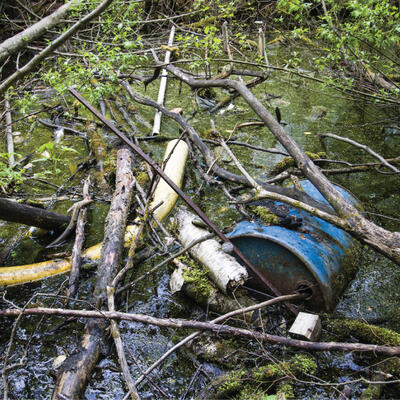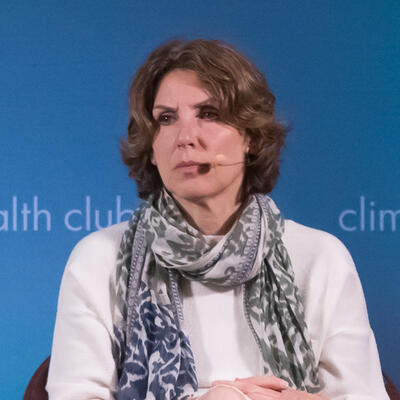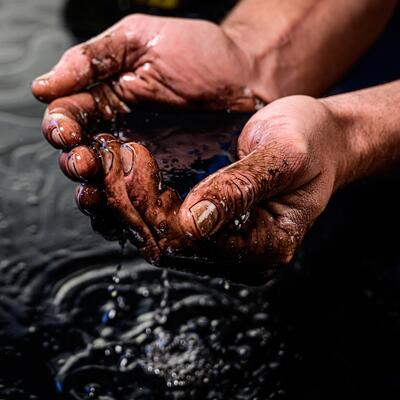
Crude Awakening: Why Ecuador Voted to Stop Drilling in the Amazon
Guests
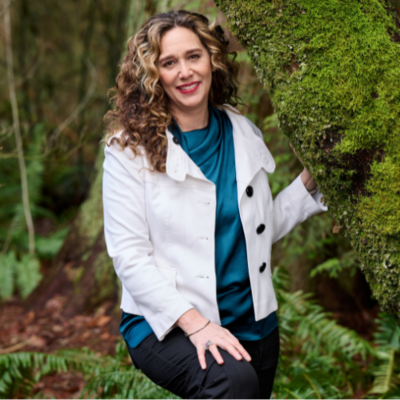
Tzeporah Berman
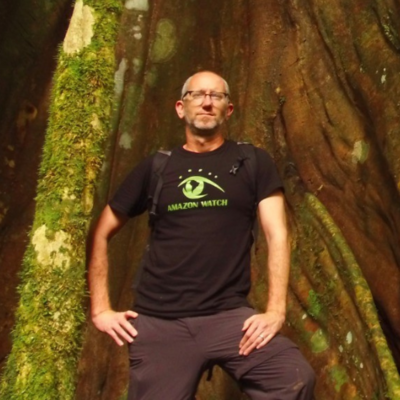
Kevin Koenig
Summary
Countries around the world are becoming more serious about reducing carbon emissions to meet international targets. At the same time, many of those same countries – including the United States – are still approving new oil and gas projects, committing us to more deadly fires, floods, and heat. The global economy still runs on fossil fuels, and the profits are just too good for some to pass up.
“We currently have enough fossil fuels on the surface of the planet – oil, gas, and coal, either on the surface of the planet or already under construction to take the world well past two degrees [celsius of warming]. So anything that we dig up now, any new projects, are additional fossil fuels that we actually can't afford to burn,” says Tzeporah Berman, chair of the Fossil Fuel Non-Proliferation Treaty Initiative. Hence the familiar rallying cry among climate activists to “keep it [oil] in the ground.” But for oil-producing countries, that's a very tough sell.
“Like with nuclear weapons, right now on fossil fuel production, no country wants to unilaterally disarm,” says Berman.
And yet, a small but growing number of countries are taking a stand to leave those future emissions in the ground, at the expense of their own revenues.
“The Fossil Fuel Nonproliferation Treaty is an initiative that is designed to ensure greater international cooperation between nation states to curb the expansion of fossil fuels,” Berman says. In essence, the idea is to limit who gets to produce emissions and how much.
“We now have Columbia, which is one of the largest coal exporters in the world. Having a country that produces fossil fuels say, ‘we recognize that we all need to stop expanding the production of fossil fuels, but we can't do it without greater international cooperation,’ that was a tipping point,” she says. “I think by the end of the year, we'll likely have 20 countries, and we'll start designing the treaty.”
Ecuador is home to part of the Amazon rainforest — and under it, oil-rich land. 17 years ago, it asked the international community to help pay for the lost earnings from NOT drilling in the Amazon.
“It was very much a revolutionary idea. No other nation had proposed that, saying ‘we're going to keep one of our largest oil fields in the ground if the world can offset our foregone revenue,’” says Kevin Koenig, climate, energy, and extractive industry director at Amazon Watch, a nonprofit that works to protect the rainforest and advance the rights of Indigenous peoples in the Amazon Basin.
The world said no, and the drilling commenced. But more recently, the people of Ecuador decided to limit production anyway.
Last August, the country held a national referendum to stop drilling and leave more than 700 million barrels of oil in the ground. And the people voted in favor of the move. Koenig says oil hasn’t been the golden ticket the Ecuadorian people initially hoped for. The industry has left a lot of environmental destruction and pollution in its wake. That history, combined with worries about climate disruption and harm to Indigenous communities in the Amazon, likely encouraged many Ecuadorians to vote in favor of the referendum, he says.
“If oil can be kept in the ground by a country that is so heavily dependent on oil revenues, then why can't some of these other big producers do it?” says Koenig.
This episode also features a story on Yasuní National Park produced by Mateo Schimpf and reported by Kimberley Brown.
Episode Highlights
02:30 – Ecuador’s early history with oil extraction and environmental contamination
07:00 – Former President Rafael Correa floats proposal for international community to help pay to keep Amazon oil in the ground, which fails
14:00 – Ecuadorians pass a national referendum to stop drilling in the part of the Amazon
21:00 – How climate factored into the vote
24:30 – Story from Kimberly Brown on how Ecuadorians feel about the vote and the role of oil in their country
36:00 – Work of the Fossil Fuel Non-Proliferation Treaty Initiative
40:00 – Getting more countries to endorse the idea of the treaty
50:00 – How this approach differs from fighting oil pipelines directly
54:30 – Need for compassion and just transition for fossil fuel industry workers
Resources From This Episode (7)
Full Transcript
Note: Transcripts are generated using a combination of automated software and human transcribers and may contain errors. Please check the actual audio before quoting it.
Greg Dalton: I’m Greg Dalton.
Ariana Brocious: And I’m Ariana Brocious.
Greg Dalton: And this is Climate One.
[keep it in the ground! chant]
Greg Dalton: “Keep it in the ground.” It means, STOP EXTRACTING oil, gas and coal. It’s the opposite of “Drill Baby, Drill.”
Ariana Brocious: And there’s real truth to it: There’s no way we can stay under the emissions target set by the Paris Accord if we burn all the oil and gas that’s already planned to be developed and sold. And we know that’s kind of like intentionally setting our homes on fire – because of all the planet-warning emissions it will add to the atmosphere.
Greg Dalton: Yet if you’re a petrostate or a company, or a community that relies on the taxes those companies pay, leaving fossil fuels in the ground means leaving trillions of dollars in the ground. How’s that going to happen when so many people depend on it?
Ariana Brocious: But there’s actually an effort to get this done. There’s a growing movement of countries pushing for fossil fuel nonproliferation – and they’re trying to pressure others to join them. We’ll hear about that in this week's show.
Greg Dalton: Everyone sees the age of oil sunsetting. Even Saudi Arabia’s former oil minister often said the stone age didn’t end for lack of stones and the oil age won’t end for lack of oil. And yet, every oil-producing country wants to continue drilling for as long as possible, to hold onto this extremely lucrative industry. For a country to go against their economic self-interest is truly remarkable.
Ariana Brocious: Ecuador is home to part of the Amazon rainforest – and under it, oil rich land. Last August, the country held a national referendum to stop drilling, and leave a bunch of that oil in the ground. And the people voted in favor of the move. What brought the Ecuadorian people to this point is an intricate and fascinating tale. And that’s what we’re going to unpack for you now.
[music shift]
Kevin Koenig is with Amazon Watch, a nonprofit that works to protect the rainforest and advance the rights of Indigenous peoples in the Amazon Basin. He also spent a number of years working within the Ecuadorian government. As he told me, oil hasn’t been the golden ticket the people initially hoped for. And the industry has left a lot of environmental destruction and pollution in its wake. The story begins 80 years ago…
Kevin Koenig: Oil was first discovered in Ecuador in the 1940s by Shell Oil, but it was in remote areas of the Amazon and they were unable to sort of get it out of the ground and get it to market. But then in the late 1960s, Texaco came into the northern part of the Ecuadorian Amazon and began to drill for oil. And it was a big thing for the country. The first barrel of oil that came out of the ground in an area known as Lago Agrio was taken to Quito. It was given its own parade. It was blessed by the archdiocese of Ecuador. And it was really seen as the ticket to, you know, quote unquote, the developing world for Ecuador, right? Oil – It was a new era in Ecuador. It was going to be the panacea that would bring Ecuador out of poverty and basically alleviate all the ills of Ecuador, and in fact, the opposite happened.
Ariana Brocious: Right, so during three decades of oil extraction, Texaco, which was later acquired by Chevron, created an ecological and public health disaster, dumping millions of gallons of toxic wastewater and oil into the Amazon. How did that affect the country's view of oil?
Kevin Koenig: During this time, basically what you had was Texaco operating and really just, you know, drilling and dumping right for decades and people were getting sick. Rainforests were being deforested, oil flares burning 24/7, all throughout the northern Ecuadorian Amazon. And local communities were, you know, bearing the brunt of the extraction, saw their rivers turn black. All of the area that they were operating in was and still is indigenous territory of five indigenous nations who were, you know, using rivers to fish, to drink, to bathe, to wash clothes. And so they were, living amongst oil infrastructure and spills. People saw for the first time the impact of industry in a place like the Amazon. Meanwhile, in other parts of the country, I think questions began to arise because poverty continued. It was not, people began to talk about the resource curse, right? And is this plethora of oil actually leading to more debt and dependency?
Ariana Brocious: Right. I mean, the profits from a company like Texaco or Chevron are not generally given to the country where they're doing the exploration. I mean, there's probably some percentage, but a lot of it's being exported. So Ecuador's economy is heavily dependent on oil, has been for a while. It's one of the top South American oil producers. But in those decades, in the last half century, has oil and those profits helped the country advance in a meaningful way that reflects in the life of an average citizen?
Kevin Koenig: During those decades, I think what happened was the oil wealth really became a sort of misnomer, right? Because this is where we started to see high levels of corruption happening, right? And also during a chunk of that time, there was a military dictatorship. So the economic benefit of the oil industry was not coming down to local people. It was being concentrated in the hands of companies and, and the government. Also during this time you had other, international financial institutions like the IMF, the International Monetary Fund, the World Bank, who because Ecuador now had discovered oil and was producing oil, were very eager to extend lines of credit to Ecuador. And so what you started to have happen was, loans, a lot of borrowing, and then, of course, when the price of oil changes like a, you know, a commodity like that, that fluctuates, the price bottoms out, the economy of Ecuador, that depends on this oil revenue, tanks basically. And so that's what sort of caught the country in this cycle of debt and dependency where, borrowing and borrowing and borrowing, has, you could argue, left them poorer than when the oil boom began.
Ariana Brocious: Right. So you were brought on in 2008 into the Ecuadorian government to help with a proposal spearheaded by former president Rafael Correa, who wanted to maybe change the equation, right? And sort of see if the international community would support Ecuador in, keeping some of that oil in the ground, right? Can you tell us about that?
Kevin Koenig: Sure. So in 2007, when Rafael Correa came into power and he's sort of a self-defined, you know, leftist progressive, you know, his administration was filled with a lot of people from civil society. and they were really, I think, thinking outside of the box. And Rafael Correa before he became president, he was economic minister with a different administration and he was looking at this issue of the connection between oil and debt. And so when he came into power, he was very eager to think about different ways in which Ecuador could get off of oil. And so the proposal that was put out to the world was also sort of based on this idea of ecological debt, right? And some of the climate conferences and the principle of shared but differentiated responsibility where Ecuador as a country has not contributed in a significant way to the climate crisis. Meanwhile, northern countries bear the historic responsibility for the climate change problem. So a lot of the proposal to keep fossil fuels in the ground in the ITT fields and ask for international collaboration from northern countries was based on that idea.
Ariana Brocious: And the ITT fields is just the name given to these particular oil fields in this Yasuni National Park, right?
Kevin Koenig: Yeah. So the area of Yasuni that we're talking about are three oil fields. The Ishpingo, Tambococha, Tiputini fields. And they are one of Ecuador's largest oil fields, right? It's about 800 million barrels of oil. So it's significant reserves. So at the time in 2007, this is a big deal. It was very much a revolutionary idea at the time, you know, no other nation had proposed that saying we're going to keep one of our largest oil fields in the ground if the world can step up and help offset our foregone revenue.
Ariana Brocious: And so this proposal was floated to the international community and, basically nobody wanted to participate, right? There was not enough willingness on the part of the U.S., other countries to compensate Ecuador in exchange for not developing these oil fields, right?
Kevin Koenig: Right. It was put out to the world and, you know, quite honestly, the response was crickets more or less. It's important to understand too at this time, politically what was happening in Latin America. You had Correa, a leftist. You had Hugo Chavez in Venezuela, you had Evo Morales in Bolivia. And they were dubbed by politicians and media as the Latin American axis of evil. And so, the proposal was really seen as almost a ransom. Like Correa was saying, Hey, you know, northern countries give me money or the forest gets it. Which is really unfortunate because, fast forward to where we are now. I mean, now there have been multiple reports from the International Energy Agency, among others saying, look, we need to keep two thirds of fossil fuels in the ground the world. We need a rapid transition away from fossil fuels but those reports hadn't come out yet. So the proposal from Correa was really an outlier at the time.
Ariana Brocious: So what's so fascinating is that this proposal to the international community fails. But then, it sort of changes shape and becomes a national referendum to do this without compensation from other countries. And so last year, Ecuadorians voted in favor of stopping development of new oil wells in this part of the Yasuni National Park, which is a UNESCO Biosphere Reserve, keeping around 726 million barrels of oil underground does not block drilling in the whole park, just this part of it. How did that referendum come out of this effort from the former president?
Kevin Koenig: The proposal of the government was widely popular in Ecuador. I mean, the polling was showing that 90% of the population was in favor of this, this new thinking that they could keep fossil fuels in the ground and still have some revenue for their economy, And so Correa in 2013 says, Look, the world hasn't stepped up. We didn't get the money we needed. And we're gonna, we're gonna drill there. So in 2013, he announces plans to begin extraction of these oil fields and the reaction from civil society was swift and strong. I mean, protests erupted around the country in the capital city of Quito. And they began to organize and a collective was formed called Yasunidos, and they began to collect signatures throughout the country. A couple of years later, they had obtained 800,000 plus signatures, more than double the amount needed to qualify for a referendum. Unfortunately, though, this is where some questionable electoral practices and maybe just outright corruption began because in the counting of these signatures in the validation process, the Correa administration basically threw out more than half, leaving it just short of how many signatures were needed for a referendum. Community organizers then took the administration to court and challenged that. That case took almost 10 years to wind its way through the court system until finally, a little over a year ago, the Constitutional Court found that indeed, the signatures were valid. There are enough to qualify for a referendum and that this question of whether or not Ecuadorians were in favor of keeping fossil fuels in the ground, in the ITT fields, that would go to a vote. However, importantly, what has changed since, you know, that decade, while the case wound its way through the courts, oil drilling began. And so you now had a situation where there are more than 200 wells that were in production in the ITT fields. Roads have been constructed. and there are plans to build up to 600 more wells. So, fast forward to last August when the vote happens, they're basically asking voters to say, you know, are you in favor of keeping this in the ground? And that means not extracting anything new, but it also means dismantling and decommissioning that existing production that is currently underway.
Ariana Brocious: Which is a bigger endeavor, than never doing it in the first place. So this is such an interesting case for so many reasons, but I want to point out the fact to an American audience. So this is a national referendum, a national vote for activity that would only take part in one corner of the country. So it'd be almost like if Americans were voting collectively on whether or not to allow oil drilling in part of Texas or something. And we hear elsewhere in this episode that some locals who depend on the oil industry, aren't thrilled about the decision, the two provinces where the vote didn't pass were the two main oil producing regions of Ecuador. Though it did pass nationally, and as it sounds like there's a lot of favor in some of the more larger cities, what's been the sense among people about the result of the vote?
Kevin Koenig: I think, to a certain extent, the vote speaks for itself in that, you know, it won with 59%, right? It's not quite a landslide, but it was not, you know, it didn't, just squeak by, right? This is a large percentage of the population that is In agreement with keeping fossil fuels in the ground there. I think a lot of that vote stems from the contamination that has been so associated in those decades of that toxic legacy of the industry in the country. And people really not buying this myth that oil extraction is the key to development in the future of Ecuador. Certainly in those two provinces, that is where the oil industry began, this is where the first Texaco work camp began. And then the industry is built up tremendously in those two provinces. It's ground zero for oil companies in oil servicing companies and all the industry that has started sort of supports the extraction process. So it's not surprising that this question in the referendum might not have passed in those two provinces. But, at the end of the day, it is a national referendum, right? And so, I think it does speak to this question of, as Ecuador moves away from oil extraction, what does a just transition look like for workers and communities that are dependent on the industry?
Ariana Brocious: Mm hmm. You mentioned that the area, this Yasuni National Park, is inhabited by Indigenous people, a few different groups. Where did they fall in the vote, if you have a sense? What is their experience with the oil industry, and are they supportive of keeping it in the ground?
Kevin Koenig: Yeah, so Yasuni National Park is the ancestral territory of the Guarani indigenous peoples. And there are also two Guarani clans, which are the Tagayeti and Taramanani, which are living in voluntary isolation. And that is an important component of this whole conversation. And I think it was a big motivator as well of why the referendum question won so handily because oil extraction in that area, you know, it is a death sentence for people living in voluntary isolation, right to be having tractors and oil infrastructure built in areas that they are using. They're nomadic, right? This is their traditional areas for their hunting grounds, where they're gathering food, is being turned into an oil field. And so, if drilling were to continue, that's an existential threat for them. So I think that was a big part of what voters in the country were raising concerns about. The Guarani, their federation has been supportive and they just came out, this week as well with publicly pressuring the current government in Ecuador to comply with this referendum, and to keep these oil fields permanently in the ground. There are some communities, right, that have been affected by drilling and other areas of the park that have signed agreements with different oil companies over the years and I think there we have sort of seen, a cycle of, oil companies that are extracting billions of dollars worth of oil and what is provided to local communities, I think can be characterized as trinkets and beads. And you have communities that have become entirely dependent on oil companies for basic services like clean water, which speaks to the fact that you know, if the industry is having such an impact on the ecosystems and water systems, the local communities that they have to provide bottled fresh water for local communities, that's a problem.
Greg Dalton: We’ll pick up our conversation with Kevin Koenig of Amazon Watch after a quick break. Also coming up, we’ll hear from Ecuadorians themselves about the vote to keep oil in the ground and protect their environment. Not everyone supported the move.
Magdalena: Well, I voted no because I benefit from it..
Greg Dalton: That’s up next, when Climate One continues.
Ariana Brocious: Please help us get people talking more about climate by sharing this episode with a friend. And we’d love to know what you think of the show. Please give us a rating or review. You can do it right now on your device – and it really helps people find the show. Thanks!
This is Climate One. I’m Ariana Brocious. Today we’re hearing about Ecuador’s effort to leave some of its oil in the ground – a controversial idea, but one that climate scientists say is necessary if we want to avoid the most catastrophic effects of a hotter climate. Let’s get back to my conversation with Kevin Koenig of Amazon Watch. Crude oil is Ecuador’s most important export, so I asked him: if the country stops production on these wells in the Amazon, what would be the impact?
Kevin Koenig: Ecuador is heavily dependent on oil revenues, right? It's about a third of their export revenue. and I think it's about 6 percent of their GDP. So it plays a big role. Right now, the production from this area is about 72,000 barrels per day. So it's significant and, I think what is at play here, though, is, these fields are going to be retired prematurely. So there is a significant, economic toll that it would take, on the country of Ecuador. But there are other economic alternatives for the country where this revenue could potentially be replaced or augmented, in different ways.
Ariana Brocious: Most domestic oil production is now run by the state owned PetroEcuador, right? What does the current administration feel about this requirement now to stop production, remove the infrastructure? What, what does that mean in terms of shutting down these wells? How likely are they to comply?
Kevin Koenig: Since the referendum, passed last August, 2023, the administration of current president Daniel Naboa, they are certainly dragging their feet. Clearly the administration, together with Petroecuador, have been doing everything they can to delay implementing this and citing the economic toll to the country, the economic cost of decommissioning these wells and dismantling infrastructure and repairing and remediating areas, where extraction has been happening. So, there is real concern that the government is, in the short term, not going to comply with this. Once the referendum was passed, the constitutional court gave the government a year to comply and only recently, have they even produced a first plan of what this is going to look like. But they're talking about, you know, it will take them 7 to 10 years to actually implement this, but 7 to 10 years again, the question of biodiversity, of indigenous rights, of isolated peoples – they can't wait.
Ariana Brocious: Yeah, I'm curious where the discussion of climate change and concerns around that in particular, come into this discussion for sort of regular Ecuadorians, people who voted on the referendum. What about climate disruption? Is that part of how people were weighing this vote?
Kevin Koenig: Absolutely. I think the climate question was also central to the way people voted. I mean, Ecuador is, like a lot of other places in South America and particularly the Amazon region of Ecuador, is already seeing the impacts of climate change, from extreme drought, to extreme historic flooding to hail the size of softballs falling in the Amazon. And it's become very obvious though, that they also don't have a lot of the resources to adapt or mitigate the impact that they're seeing. And I think the climate justice issue was a big part of why you saw major, you know, movement from youth across Ecuador and Indigenous youth really kind of raising this question, saying, look, Ecuador bears so little of the responsibility historically for climate change crisis, but is on the front lines and bearing burden of the tremendous impacts of climate change. And I think that there's a new generation that are really, you know, behind what I think is a vote for hope, honestly. I think they're saying Ecuador can lead the world. If oil can be kept in the ground by a country that is so heavily dependent on oil revenues, then, why can't the United States or Canada or Norway or some of these other big producers do it?
Ariana Brocious: Yeah, that's a great framing. So we know Columbia signed on to the fossil fuel non proliferation treaty. What's the potential for this kind of action to expand to other parts of the Amazon, maybe within Ecuador or other countries that are part of the Amazon or other parts of the world?
Kevin Koenig: The referendum vote in Ecuador, I think does really have the potential to be replicated and obviously, there are different routes to get to this conclusion of keeping fossil fuels in the ground. It can be by a referendum vote. It can be by legislation or executive orders or there's many different pathways. Citizens can pressure their leaders to make this happen. In the case of Columbia, they're leading the charge and saying very vocally that, we are committing to nothing new. No new expansion, no new exploration. The Amazon as an ecosystem, as a biome is at a very dangerous tipping point where it's facing ecological collapse if forest degradation and deforestation continues. And so I think there is a general rising awareness of Amazonian countries that this tipping point is very real, and it's going to impact people who live in the Amazon, but will have bigger implications for our climate.
Ariana Brocious: Kevin Koenig is Climate, Energy, and Extractive Industry Director at Amazon Watch. Kevin, thank you so much for joining us on Climate One.
Kevin Koenig: Thank you so much. Been a pleasure.
Greg Dalton: The referendum to stop drilling in part of Ecuador’s Amazon rainforest passed about a year ago. We wanted to know more about what average Ecuadorians think about this vote, especially in the provinces where drilling is happening. Mateo Schimpf of our sister podcast On Shifting Ground brings us this story.
Mateo Schimpf: THE VOTE IN FAVOR OF THE REFERENDUM TO KEEP OIL IN THE GROUND SURPRISED A LOT OF PEOPLE. AND IT SPARKED IMMEDIATE REACTION.
Kimberley Brown: A lot of people from the oil industry started speaking up right away and said, like, this can't happen. The country's going to go to hell, Oil has been a savior for us Ecuador can't afford this.
THAT’S KIMBERLEY BROWN.
Kimberley Brown: I’m a freelance journalist based in Quito, Ecuador
FOR THE PAST TWO YEARS, KIMBERLEY’S BEEN COVERING THE “KEEP IT IN THE GROUND” CAMPAIGN AND THE REFERENDUM VOTE THAT FOLLOWED.
OIL’S BEEN A LYNCHPIN OF THE COUNTRY’S ECONOMY FOR DECADES, BUT MANY URBAN AND RURAL ECUADORIANS DISAGREE ABOUT WHAT SHOULD HAPPEN NEXT.
TO FIND OUT HOW PEOPLE LIVING NEAR THE OIL WELLS IN QUESTION ARE FEELING ABOUT THE VOTE, KIMBERLEY VENTURED INTO THE AMAZON.
IT’S A LONG WAY FROM QUITO: EIGHT HOURS BY BUS TO THE EDGE OF YASUNÍ NATIONAL PARK, THEN FIVE HOURS BY BOAT UP THE NAPO RIVER. HER GUIDE IS NAMED HOLMER MOCHOA, AND THE TWO ARE HEADED TO LLANCHAMA.
IT’S AN INDIGENOUS QUECHUA (KEH·CHUH·WUH) COMMUNITY JUST A FEW MILES FROM AN OIL FIELD AFFECTED BY THE REFERENDUM.
Kimberley Brown: And then how close is the closest oil well to the village? Is it far from here or what?
Holmer: Yes, from our spot, we’re 9 kilometers to the wells.
IN 2023 HOLMER WAS PART OF THE YASUNIDOS CAMPAIGN.
IT WAS A GRASSROOTS EFFORT THAT PUSHED THE ISSUE OF STOPPING OIL PRODUCTION IN YASUNÍ TO A NATIONAL VOTE.
Holmer: Voting “yes” to stop it, was because we've seen how the oil companies have affected people, how people have suffered from diseases, how people have had to drink contaminated water
HOLMER IS A YOUNG GUY IN HIS EARLY 30s. BUT HE’S ALREADY SPENT TIME WORKING IN LOCAL GOVERNMENT AND WITH ECUADOR’S MINISTRY OF THE ENVIRONMENT.
THOSE WERE BOTH EYE-OPENING EXPERIENCES FOR HIM… AND THEY STOKED HIS FEARS ABOUT JUST HOW MUCH POWER THE OIL INDUSTRY HAS IN ECUADOR.
Kimberley Brown: When he was working as a park guard for the ministry of environment, he was telling me at one point they saw // huge streams of smoke coming out of one of the oil wells.
Holmer: One time we parked there at the production center and suddenly—I don't know what happened, but suddenly the gas started coming up. A huge flame. We wanted to go because if we are from the Ministry of the Environment, we have the right and the obligation to go and see if there was a spill or something, but they didn't allow us. The company is always above the Ministry of the Environment.
Kimberley Brown: He thought that was not right, that the private company has more say than the Ministry of Environment in who has access to the Amazon and who gets to monitor things. And so he said he quit after that moment.
OVER THE YEARS, HOLMER SAYS THOSE OIL COMPANIES HAVE SPENT TIME COURTING LOCAL RESIDENTS TO ALLOW DEVELOPMENT ON COMMUNITY LAND.
BUT ONCE THE INK DRIES ON A CONTRACT, THE OIL COMPANIES—AND THEIR FINANCIAL SUPPORT—THEY DISAPPEAR.
TO HOLMER, IT FEELS LIKE DECEPTION.
LIKE MANY WHO VOTED “YES” ON THE REFERENDUM, HE QUESTIONS WHETHER OIL COMPANIES WILL EVER DELIVER ON THEIR PROMISE TO SURROUNDING COMMUNITIES.
Holmer: When I was going around during the campaign, I would say, “Understand, it's been 10 years, how many people are working in the company? What benefits have we seen from them?” So, most have said, “We don't have healthcare attention, there's nothing in terms of social assistance, even worse in infrastructure.”
BUT OTHERS REMEMBER BACK TO 2014 WHEN OIL REPS HANDED OUT $3,000 IN CASH TO EACH RESIDENT OF THE COMMUNITY.
Magdalena: Well, I voted "no" because I benefited from it
THAT’S MAGDALENA CÓRDOBA. MAGDALENA’S TWO SONS ARE THE ONLY PEOPLE IN LLANCHAMA WHO STILL HAVE JOBS IN THE OIL INDUSTRY.
Magdalena: We can buy machines, for example, a motor, a generator, buy materials to build a house or a wheelbarrow with the money they earn from working.
MAGDALENA OFTEN WONDERS WHETHER THE PEOPLE WHO VOTED “YES” ON THE REFERENDUM WERE ACTUALLY THINKING ABOUT THE PEOPLE WHO LIVE NEAR THE OIL WELLS.
Magdalena: Of course, we are exploited, yes. But the little I have has served me. The people in the city, they live peacefully, they get what they want.
THE DIVISIONS, THOUGH, THEY AREN’T JUST BETWEEN RURAL AND URBAN ECUADORIANS.
LIKE A LOT OF PEOPLE WHO LIVE IN POOR BUT ECOLOGICALLY DIVERSE PARTS OF THE WORLD, HOLMER IS MAKING A GO OF ENVIRONMENTAL TOURISM.
FROM A PRACTICAL STANDPOINT, IT MAKES SENSE. BUT THE WAY MAGDALENA SEES IT… IF HOLMER IS MAKING MONEY OFF OF BRINGING TOURISTS TO LLANCHAMA, THEN EVERYONE IN THE COMMUNITY SHOULD GET A CUT.
Magdalena: He only wants it for himself, that's why people here don't like Holmer. They don't want him to be a guide because tourism is community-based. It's for everyone.
KIMBERLEY SAID THESE KINDS OF LOCAL POLITICS ARE A BIG REASON THAT ECOTOURISM HASN’T MADE HEADWAY IN LLANCHAMA.
Kimberley Brown: They do want to live off the rainforest, but they also want to not live in poverty.
ON HER WAY BACK TO QUITO, KIMBERLEY PASSES THROUGH COCA. IT’S A CEMENT CITY FOUNDED ON THE OIL INDUSTRY.
Kimberley Brown: Coca itself is about 50,000 people. it’s a small city, but it’s also considered to be the gateway to the Amazon…
PEOPLE FROM SURROUNDING PROVINCES FLOCKED THERE IN THE EARLY 2000s TO SERVICE PLATFORM AND PIPELINE AND SHIP WORKERS WHO WERE MOVING CRUDE OIL FROM YASUNI TO REFINERIES ON ECUADOR’S COAST.
Kimberley Brown: But that was maybe 20 years ago. When I was talking to people, they still talked about the importance of the oil industry for all of their businesses. But they also said, like, people don't come through here anymore. We need it to come back.
MERCEDES ANGORA IS THE MANAGER OF HOTEL LA MISION. SHE SAYS THAT DURING THE REGION’S OIL BOOM, HOTELS AND RESTAURANTS IN COCA WERE PACKED WITH WORKERS. AS RECENTLY AS 2014, LA MISION HAD 40 EMPLOYEES.
Kimberley Brown: And how many people are there now?
Mercedes: Three. Three. We have three, I'm here, there's the pool attendant, and there's the guard. There's no one else.
Kimberley Brown: And are you worried that if they start closing the oil wells in the jungle, would that worry you in a way?
Mercedes: Of course, because at least a lot of people come here for the boats, at least the dock is rented. They would have to close the dock, there would be no passage through here anymore, that would be stopped. But, let's hope that doesn't happen.
AFTER COVERING THE REFERENDUM FOR MORE THAN A YEAR, KIMBERLEY’S HEARD ALL SORTS OF REASONS FOR WHY PEOPLE ARE AGAINST IT.
BUT WHAT’S MOST INTERESTING IS THE WAY THAT PEOPLE FEEL LIKE THE REFERENDUM IS ALREADY AFFECTING THEM.
Kimberley Brown: Some people were falsely saying that now the oil blocks have closed and there's no business. And that's actually false because those particular oil blocks in the referendum have not closed.
THE REALITY IS THAT ONCE CONSTRUCTION ON THE OIL INFRASTRUCTURE WAS COMPLETED, THE INDUSTRY NO LONGER NEEDED ALL THOSE JOBS AND THE WORKERS WHO USED TO EAT AND SLEEP AND PARTY IN PLACES LIKE COCA.
WHEN ECUADOR’S CONSTITUTIONAL COURT OFFICIALLY RECOGNIZED THE REFERENDUM’S PASSAGE, IT GAVE THE GOVERNMENT ONE YEAR TO MAKE A PLAN FOR DECOMMISSIONING THE EXTRACTION SITE IN YASUNÍ NATIONAL PARK.
BUT FOR THE PAST SIX MONTHS, ECUADOR’S MILITARY AND POLICE HAVE BEEN CAUGHT IN A BLOODY AND EXPENSIVE WAR WITH THE COUNTRY’S GANGS.
PRESIDENT DANIEL NOBOA, WHO’S PREVIOUSLY SAID THAT THE COUNTRY DIDN’T REALLY NEED THE OIL FROM YASUNÍ, NOW CAN’T AFFORD TO LOSE IT.
IN JANUARY, HE PUT A MORATORIUM ON THE YASUNI REFERENDUM. THAT MEANS FOR AT LEAST ONE MORE YEAR, OIL PRODUCTION WILL CONTINUE.
WHEN AND IF THE MORATORIUM DOES LIFT, THE CLOCK WILL RESTART ON A PLAN TO PHASE OUT EXTRACTION IN THIS PART OF YASUNI. BUT KIMBERLEY SAID HER BIGGEST CONCERN IS FOR WHAT COMES AFTER THAT.
Kimberley Brown: I think people who have more concrete alternatives need to be working more closely with the government to make those actual plans and put them into action. There is kind of an illness here where every time a new government comes into office, they wipe the slate clean from the government before, and start everything new. And that's a problem in making any kind of alternative economy happen.
FOR CLIMATE ONE AND ON SHIFTING GROUND, I’M MATEO SCHIMPF.
Greg Dalton: If you want to know more about Ecuador’s long and complicated legal case with Texaco over the company’s environmental destruction in the Amazon, I highly recommend the podcast Drilled by our friend Amy Westervelt. Season 5 is all about the case.
Ariana Brocious: Coming up, fifty years ago, the nations of the world came together with a nonproliferation treaty to halt the production of nuclear weapons. As our climate crisis deepens, could we do the same thing for fossil fuels?
Tzeporah Berman: We currently have enough fossil fuels to take the world well past two degrees. So anything that we dig up now are additional fossil fuels that we actually can't afford to burn.
Ariana Brocious: That’s up next, when Climate One continues.
Greg Dalton: This is Climate One. I’m Greg Dalton. Countries around the world are becoming more serious about reducing carbon emissions to meet international targets. At the same time, many of those same countries – including the United States – are still approving new oil and gas projects, committing us to more deadly fires, floods, and heat. The global economy still runs on fossil fuels, and the profits are just too good to pass up.
And yet, a small but growing number of countries are taking a stand to leave those future emissions in the ground, at the expense of their own revenues. I talked about that with Tzeporah Berman, chair of a global nonprofit aimed at creating a binding, international agreement.
Tzeporah Berman: The Fossil Fuel Nonproliferation Treaty is an initiative that is designed to ensure greater international cooperation between nation states to curb the expansion of fossil fuels, the production of fossil fuels. Because to date, we have had climate policy and international agreements that focus on emissions or pollution. Countries agreeing how much they will pollute, negotiating on the space left in the atmosphere. And we haven't had any agreements on who gets to produce and how much. And so this treaty is designed to provide new global governance around the production of fossil fuels, to align the production of fossil fuels with a global carbon budget and our climate goals.
Greg Dalton: And the term non proliferation immediately brings to mind nuclear weapons. I worked in nuclear arms control earlier in my career. So how does this treaty model some of the goals of nuclear disarmament and arms reductions, really?
Tzeporah Berman: We took part of our inspiration from the campaigns on nuclear non proliferation and the analogy is definitely on purpose because, like with nuclear weapons, right now on fossil fuel production, no country wants to unilaterally disarm. We have enough. You know, when I grew up in the nuclear arms era, when the realization dawned that we had enough nuclear weapons to blow up the planet six times over. Well, we currently have enough fossil fuels on the surface of the planet, oil, gas, and coal, either on the surface of the planet or already under construction to take the world well past two degrees. So anything that we dig up now, any new projects, are additional fossil fuels that we actually can't afford to burn, i we want to meet our climate goals, if we want to ensure climate safety and, and, and to ensure that big swaths of the planet are not uninhabitable. And so the idea of a fossil fuel non proliferation treaty is a recognition that we need to stop stockpiling and that countries are going to need to cooperate to constrain what are today's weapons of mass destruction. And I know that that is quite a controversial statement to say, because we're all still dependent on fossil fuels. And to a certain extent –
Greg Dalton: They do a lot of good in our daily lives. Nuclear weapons never did me any good. Fossil fuels have done me a lot of good. Well, you could, you might debate nuclear weapons kept us safe.
Tzeporah Berman: Well, that was the idea. And, and that's kind of the second parallel is that there was a time when people thought nuclear weapons were what kept us safe. And there still is a lot of people who think that more fossil fuels are what will bring us prosperity because that's where we were. And they have. Fossil fuels have brought us prosperity. But now we have alternatives to the majority of uses of fossil fuels. And today we know, we know what we didn't know before. We know that fossil fuels, oil, gas, and coal are 86%. Those three products account for 86 percent of the emissions that are trapped in our atmosphere, creating a blanket smothering the earth and the extreme weather, the floods, the fires and the increase in all of that. But we also know that fossil fuels are the greatest cause of premature death on the planet from air pollution, from asthma, let alone the heat waves. These are toxic products, and it's only in the accumulative use over decades that we've begun to realize we’re poisoning our bodies, our air, our water, and, and, and also threatening a stable climate with their use. And so now we need to transition. But what really inspired me to create the Fossil Fuel Treaty is the idea that this strange kind of group think that we have going on that we're in a transition, but we could just keep growing the problem. We're on track today to produce 110 percent more oil, gas, and coal than we can ever burn under a two degree world. So why are we putting all of our financial and intellectual and political effort into digging up more stuff that we know we can't use.
Greg Dalton: You now have 12 signatory countries. What does signing compel them to do?
Tzeporah Berman: What they're doing is endorsing the concept. And again, similar to other treaties, nuclear nonproliferation, chemical weapons ban, landmines, we're building a group of countries that are committed to the concept. So, these countries have said, we endorse the idea of the fossil fuel treaty. We want to be the countries that start creating the rules and global governance around constraining the production of fossil fuels in an equitable way. And they are committing to work together to, with, with diplomats and lawyers and scientists from around the world that we've pulled together in the initiative to design the treaty, but also to reach out to other nation states and get them to join the treaty as well.
Greg Dalton: And, and with nuclear arms, it was really Russia and the U.S. that, Soviet Union and U.S., the two biggest holders and producers came together to lead. Now, in this case, you're kind of starting, I don't know if you call it from the bottom up with smaller producers. How many fossil fuel producers do you think you need to get together to really compel the action of the largest producers: U.S., Canada, Saudi Arabia?
Tzeporah Berman: What you really need to create a negotiating mandate on a treaty is, is to have representatives from many regions of the world, uh, to have a core group of countries. It's a misnomer to think that we need 190 countries and they have to agree by consensus. You know, that's the design of the current climate change negotiations. That wasn't the design of chemical weapons bans, of landmine treaties. What we need is probably another 8 to 10 countries, to get a formal negotiating mandate. We now have, uh, Columbia, which is one of the largest coal exporters in the world, having a country that produces fossil fuels say we recognize that we all need to stop expanding the production of fossil fuels, but we can't do it without greater international cooperation. That was a tipping point last year at Dubai and now other countries are starting to discuss engaging and endorsing the treaty. So I think by the end of the year, we'll likely have 20 countries and we'll start designing the treaty.
Greg Dalton: In nuclear weapons, there was also citizen diplomacy, there were cities that declared themselves nuclear free zones. Is there also sort of a city and state level pathway to engage in this other than nation states?
Tzeporah Berman: There is, and in fact, it's growing very fast. We now have over a hundred cities from around the world, from LA to Vancouver to Calcutta, who have passed motions at city councils, endorsing the treaty. And increasingly we have states, Hawaii was the first state actually to endorse and recently California passed motions in the Senate and in the house. And that momentum is really critical for really pushing nation states to consider a new fossil fuel treaty as a companion to the Paris Agreement. We also have a movement of organizations around the world, 2700 organizations from around the world and 117 countries have endorsed. 3,000 scientists and 101 Nobel laureates, faith groups and health groups around the world. It's really becoming a movement for the fossil fuel treaty and really anyone can join and anyone can start running initiatives and campaigns. And that's what we're starting to see around the world.
Greg Dalton: For a church or a scientist who's not involved in producing fossil fuels to say that, it's another thing for the state of California, which is a big fossil fuel producer, to say they're gonna leave some money in the ground.
Tzeporah Berman: Exactly. And, and one of the fifth largest economies. And, and imagine if under the treaty, we were able to create agreements between those who had endorsed. Not just agreements about not doing something, but also about what they do do. One of the things we're looking at right now under a treaty is what if a jurisdiction who is endorsed says, we're still going to be buying some fossil fuels between now and 2050, we're only going to buy from other treaty nation states.
Greg Dalton: Elsewhere in this episode, we hear about the national referendum vote in Ecuador to keep a certain amount of oil in the ground in the Amazon, in the Yasuni National Park. How meaningful is that? And are you concerned it might be able to be undone
Tzeporah Berman: it is incredibly meaningful, especially to those indigenous nations whose territory is being destroyed and poisoned, who still depend on those rainforests. But it's incredibly important to all of us. I mean, the Amazon is critical to all of our survival, to hydrological stability to climate stability, biodiversity stability. The idea that we're still drilling for new oil in the heart of the Amazon is, is, you know, this is humanity's stupid test right now. And, and so sure, it's an incredibly important referendum, but until the systemic causes are changed. I mean, Ecuador is drilling for new oil in the heart of the Amazon just to feed its debt. In fact, it's a debt for oil swap with China. So part of what we're looking at under the fossil fuel treaty is debt forgiveness to keep carbon in the ground. We do this all the time, right? Well, keeping humanity safe and actually keeping the amount of carbon in the ground. That is, for years, already been said by the science is critical if we're going to maintain a stable planet. That should be considered in debt agreements, in trade agreements, and in tax agreements.
Greg Dalton: Right. President Biden has done more to address climate than any U.S. president, and the U.S. is producing record amounts of fossil fuels. Both things are true. Of course, the increase in production started under Obama. It's due to fracking more than government policy, really. How do you see those two truths of peak production and more climate action?
Tzeporah Berman: This is exactly what happened in my own country. I'm Canadian. And when I started this work, it was because of my work in the tar sands in Alberta. Really understanding that we could have a new prime minister and at the time a new premier in Alberta that was committed to climate action. I believe the Biden administration is committed to climate action. I agree with you about the IRA. It's significant. But again, it focuses on pollution reduction, emissions reduction, reducing the demand for fossil fuels, while just allowing the production to grow. Again, what we build today will be what we use tomorrow. And the idea that the Biden administration is saying they're in line with the science and their climate leaders, while completely ignoring the part of the science from the International Energy Agency, from the Intergovernmental Panel on Climate Change that says no new projects fit under our climate policy, under net zero agreements or under our agreements under the Paris agreement. So they keep building more and saying that's okay because everybody has a right to produce. Well, if every country and every company is saying, yes, the world's going to use less. But it might as well be ours. So we're okay to continue expanding. Then we've got a problem.
Greg Dalton: What would you say to people that, that, you know, that constraining fossil fuel supply, if you're really successful, will spike prices. And then you have yellow jackets in France, you have cranky voters who vote out climate friendly politicians.
Tzeporah Berman: It's a really important point because we can't look at the infrastructure that we need to build and the modeling as though politics and culture don't exist. And, so I agree that that's a really critical point. But two things, first of all, this idea that we have to allow the markets to function, that our job is to maintain stable markets? Our job is to maintain a livable planet and to save as many lives as we can right now. And there have been many times throughout history when governments have intervened to ensure a managed decline of a product, to regulate the markets. And that's what we're suggesting has to happen now. The fact is that the fossil fuel industry will decline over time because we're seeing the uptake of new technologies and EVs and battery storage, the drop in the price of renewable energy, but right now the markets are distorted. They're distorted by about 13 million dollars of fossil fuel subsidies a minute, according to the IMF. So, massive amounts of fossil fuel subsidies distort the market right now. But to your point about price, I think it's a really critical point. If we do this well, then we're constraining demand, reducing the demand for fossil fuels by giving people and ensuring that everyone has access to solutions. You don't need to buy gas for your car if you have accessible public transit, if electric cars are subsidized, etc. You don't need to buy more fossil fuels to heat your home if you can get heat pumps and that everyone has access to that, whether you're wealthy or not. If energy efficiency programs and retrofits and insulation are available to people. So if we ensure good programs to reduce demand and pollution and our dependence on fossil fuels at the same time constraining their production, then yeah, the price, the price may go up, but we'll need less of it.
Greg Dalton: Right. And you, you fought against six pipelines and at some point you realized you needed a different approach. How did that realization come about that maybe you were playing a game of whack a mole?
Tzeporah Berman: Well, it was from the experience of playing the game of whack a mole. I mean, I spent over 10 years working on pipeline campaigns from Enbridge to Energy East to Keystone, Trans Mountain. And every time we were able to slow down or stop a new piece of fossil fuel infrastructure, and these pipelines were essential for growing the size of the tar sands, which is one of the highest carbon intensive and dirtiest oil projects on earth. Every time we were successful the industry would just propose a new one. They have a lot of money, right? And that money makes sure that they have a significant influence in policy, but also that they can just continue to, to propose and make cases for new projects.
Greg Dalton: You know, stopping Keystone doesn't change demand. This is the debate I always have with my friends who are advocates who feel like, you know, stopping Keystone was a win, it didn't change demand at all.
Tzeporah Berman: What stopping Keystone did is it decreased the potential of the expansion of one of the biggest pools of carbon on earth, under Alberta, the Alberta tar sands.
Greg Dalton: Maybe the oil then comes from a cleaner place somewhere else.
Tzeporah Berman: And, that idea that if you reduce one project that demand stays the same or the amount consumed stays the same increasingly is not true because again, you're not looking at political leadership and culture, which matter. The canceling of that project, what Obama said, in that speech, similar to Biden putting the recent moratorium on LNG has reverberations around the world. Oh, well if he's doing it, maybe we should do it too. Oh, there, there, this, this is a new norm for climate policy and, and that empowers institutions to start looking objectively at whether or not fossil fuel infrastructure is in line with climate. So again, it's a norm shift towards recognizing that, oh, actually, we're supposed to be constraining production in line with climate goals as well as demand. How does that work? So it's a pebble in a pond that has an impact, uh, and far greater. Another point that I wanted to make when we talked about Alberta, one of the things that I realized is that, this is the wealthiest industry in the world, right? throughout history. The oil and gas industry has made 2 billion a day, every day, for the last 50 years. So they will swamp every process, and that's what they've been doing, to ensure that they get access, that they get their new infrastructure, that they, they get now support for their carbon capture and storage delusional plans that this can somehow save us, that they can decouple emissions from production, reduce the amount of emissions, even though production can rise. And, and that delusion is one of the things I learned, in the oil patch, when I spent those several years as the co chair of the Alberta Oil Sands Advisory Working Group, I learned that they're really good people. who work in the fossil fuel industry and they're good people and they're stuck in bad systems and that they have kind of moved from a denial of climate change to a delusion and a faith in technology that is blind, because the data is very clear that those technologies are not working and will not work at scale and are not cost competitive compared to other solutions that do exist, like renewable energy and energy efficiency and electrification. But they're, they're ideologically so focused on figuring out a way to keep their cake and eat it too.
Greg Dalton: Did you ever talk to individuals, rank and file or others who say like, ah, who expressed doubt, who maybe thought like, wow, maybe we are trapped in this fool's system or we're, we're telling ourselves a story to justify our continued existence and job, et cetera. Do you ever have people who came to your side?
Tzeporah Berman: Oh, all the time, all the time. So there are a number of people who've worked in the industry that have left the industry and have contacted us wanting to work on the treaty or wanting to work on various pipeline campaigns. And certainly there are people who still work in the industry who contact us saying, you know, can I provide some information or perspective? And I want to be a bridge and, and I actually followed I followed some of those leads for a while and tried to create some of those bridges and what I realized is if for people who continue to work in the oil and gas companies, they will always be limited by their job, which requires them to increase profit margins to increase the bottom line and these big oil and gas companies are not designed to become distributed renewable energy companies and and they never will and they and they never will manage their own decline. That's the mistake that we've made and including them in negotiations and in designing policy etc. And that's why governments need to regulate the phase out of fossil fuels.
Greg Dalton: And you have family, I believe, who work in the tar sands. How do you navigate those relationships? And do they feel you're targeting their livelihood with this treaty? Are they in that camp you just described?
Tzeporah Berman: Not only my family, but a lot of people that I've talked to in the oil sands would like to be working other jobs. I mean, these are dirty products. These are dirty jobs. They threaten people's health. They threaten people's lives. They're often jobs that are remote for weeks on end where they're torn away from their families. These are hard jobs. And so would they like to be working in a different industry, a cleaner industry, a safer industry? Would they like to not go home and have their kids, say, hey, we're living in a climate emergency and you're making it worse? These are hard times and we need to have empathy and we need to have compassion. But we can't afford to slow down the transition because it will happen. It will happen as a managed or an unmanaged decline. And so I just have been trying to use language when I talk to people about the need to create a plan, about the need for all of us, for all of us to work together, and not to be pointing fingers. One of the things we see in the polling is that people know. People are experiencing climate change every day in their lives. They know it and they know it's our, our, our responsibility, but they feel like they're alone. They think, they think that they're not part of the majority, but they are. And showing compassion to the people in the industry and especially to the workers who need a plan for a change doesn't mean that we shouldn't call out the companies for what they're doing.
Greg Dalton: Compassion, not villainization for the rank and file workers while maintaining goals and speed.
Tzeporah Berman: That's it. That's all we need to do.
Greg Dalton: Okay. Thank you very much for coming on Climate One.
Tzeporah Berman: Thanks for having me.
Ariana Brocious: That was Tzeporah Berman, chair of The Fossil Fuel Nonproliferation Treaty Initiative. And that’s our show. Thanks for listening. You can see what our team is working on next week by subscribing to our newsletter – which also rounds up the biggest stories in the world of climate. Sign up at climate one dot org.
Ariana Brocious: And that’s our show. Thanks for listening. Talking about climate can be hard, and exciting and interesting -- AND it’s critical to address the transitions we need to make in all parts of society. Please help us get people talking more about climate by giving us a rating or review. You can do it right now on your device. Or consider joining us on Patreon and supporting the show that way.
Greg Dalton: Brad Marshland is our senior producer; Our managing director is Jenny Park. Ariana Brocious is co-host, editor and producer. Austin Colón is producer and editor. Megan Biscieglia is producer and production manager. Wency Shaida is our development manager, Ben Testani is our communications manager. Jenny Lawton is consulting producer. Our theme music was composed by George Young. Gloria Duffy and Philip Yun are co-CEOs of The Commonwealth Club World Affairs, the nonprofit and nonpartisan forum where our program originates. I’m Greg Dalton.
